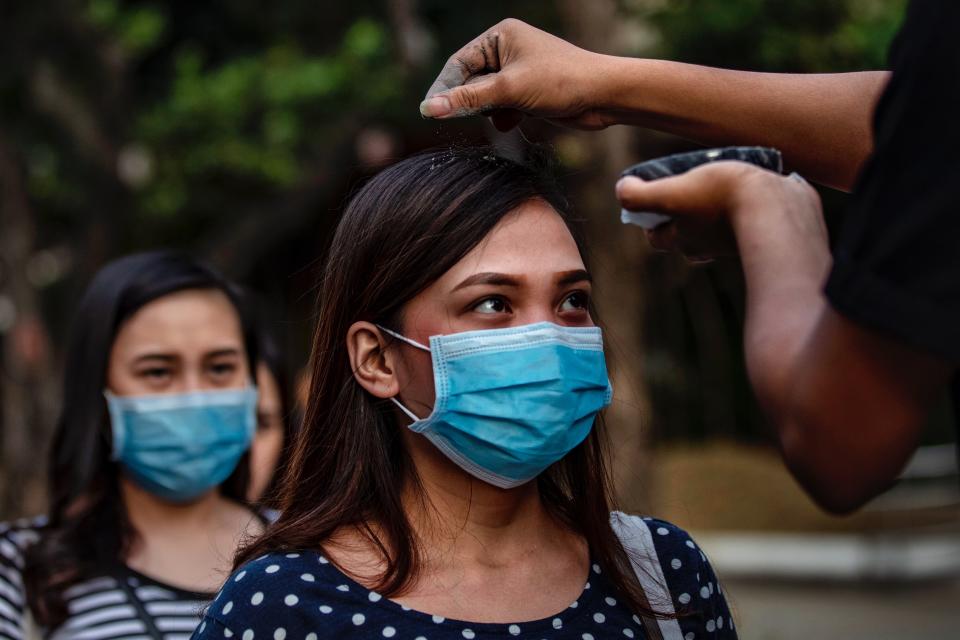Kate Hudson criticised for wearing 'ineffective' face mask – but do they protect against coronavirus Covid-19?

Kate Hudson is facing criticism for wearing an “ineffective” mask.
The actress shared a photo of herself in a protective face mask with her 11.7 million Instagram followers, captioning it “Travel. 2020” with a shocked face emoji.
She did not mention the current coronavirus outbreak,
Despite the post gaining more than 145,000 likes, followers were quick to tell the How To Lose A Guy In 10 Days star that her mask would do little to ward off infection.
One Instagram user commented: “Masks don’t work 100% – read up on it”.
Another said “those masks do nothing”, while some warned that the star’s “exposed” eyes could leave her vulnerable to infection.
Read more: How many people could become infected with coronavirus Covid-19?
The emergency of coronavirus Covid-19 has sparked fear all over the world, and Hudson is not the only celebrity to be reaching for face masks when travelling.
Simon Cowell admitted to being “terrified”, saying he would “100%” make his six-year-old son Eric wear a mask during a trip to Disneyland Paris.
Caitlyn Jenner’s son and The Hills star Brody Jenner snapped himself wearing a face mask aboard a flight at Taiwan Taoyuan International Airport. Taiwan has 31 confirmed cases of Covid-19.
Globally, confirmed cases exceeded 81,000 on Wednesday, 78,064 of which were in mainland China, according to John Hopkins University data.
While the rate of infection seems to be plateauing in China, the virus has crossed national borders into more than 30 countries.
The outbreak in South Korea is second to that in China, with more than 1,100 confirmed cases and 11 deaths.
Italy has also seen 11 fatalities and over 300 cases, making it the worst-affected country in Europe.
Out of 6,795 people tested for coronavirus in the UK, 13 were found positive for the coronavirus.

Do masks help stem the spread of Covid-19?
Little is known about the transmission of the virus, which was virtually unheard of two months ago.
Authorities have confirmed, however, that Covid-19 spreads via infected droplets sneezed or coughed out by a patient.
A mask that blocks these droplets from the nose or mouth may therefore be protective to an extent.
Surgical masks, worn by doctors during operations, block liquid droplets that may “splash” the face.
They do not, however, fully seal the nose and mouth or generally cover the eyes.
The World Health Organization (WHO) claims that hands can transfer Covid-19 to the eyes.
Dr Wang Guangfa alleges that his left eye became inflamed after treating a patient at Peking University hospital, South China Morning Post reported. He later tested positive for coronavirus.
Dr Stephen Thomas, from the State University of New York, called it a “plausible but unlikely” route of infection.
Read more: Coronavirus Covid-19 'does not meet the definition of a pandemic'
Studies suggest surgical masks are more effective when used in hospitals than by the public.
This is thought to be due to doctors also having the protection of gloves, goggles and gowns.
Hospitals are also disinfected regularly, with masks theoretically being thrown away after every use.
The surgical mask N95 respirator filters “at least 95% of airborne particles”.
It supposedly filters particles as small as 0.3 microns (0.0003mm).
Coronaviruses are on average a little over 0.1 micron (0.0001mm) and could therefore get through.
A study by the UT Southwestern Medical Center found “no significant difference in the effectiveness” of standard surgical masks and N95 respirators when it comes to preventing flu.
N95 respirators reportedly have to be properly fitted to a user’s face and are unsuitable for children or those with facial hair.
Users often also find them uncomfortable, complaining of difficulty breathing. This may be problematic among coronavirus patients, with breathlessness being a tell-tale symptom.
Adherence could also be an issue.
Professor Jonathan Ball, from the University of Nottingham, previously told the BBC: “It's quite a challenge to keep a mask on for prolonged periods of time”.
Dr Jake Dunning from Public Health England added: “Research shows compliance with these recommended behaviours reduces over time when wearing face masks for prolonged periods.”
Well-meaning people can also still get infected if their hands become contaminated while taking the mask off.
It is unclear whether Covid-19 can survive on surfaces, with cold and flu viruses lingering for up to 48 hours.
“Face masks play a very important role in clinical settings, such as hospitals,” said Dr Dunning.
“However, there is very little evidence of widespread benefit from their use outside of these clinical settings.”
Read more: How to stay calm amid the coronavirus outbreak
Nevertheless, the US Centers for Disease Control and Prevention recommends those with coronavirus “wear a face mask when in the same room with other people and when they visit a healthcare provider.
“If they cannot wear a face mask, the people who live with them should wear one while they are in the same room”.
The WHO adds that people “only need to wear a mask if they are taking care of a person with suspected infection”, or if they are coughing or sneezing themselves.
It says masks are “effective only when used in combination with frequent hand-cleaning with alcohol-based hand rub or soap and water”.
The organisation also advises “social distancing” by staying “at least one metre (3ft)” from “anyone who is coughing or sneezing”.
Avoid touching your eyes, nose or mouth with “unclean” hands, and throw away used tissues immediately, it adds.

What is Covid-19?
Covid-19 is one of seven strains of the coronavirus class that are known to infect humans.
Others range from the mild common cold to severe acute respiratory syndrome (Sars), which killed 774 people in 2004.
Most of the people who initially became unwell worked at, or visited, a seafood and live animal market in the Chinese city of Wuhan.
Symptoms tend to be flu-like, such as fever, cough and breathlessness.
Four out of five cases are believed to be “mild”; however, some people develop pneumonia.
This comes about when a respiratory infection causes the alveoli (air sacs) in the lungs to become inflamed and filled with fluid or pus.
The lungs then struggle to draw in air, resulting in reduced oxygen in the bloodstream.
“Without treatment the end is inevitable,” said the charity Médecins Sans Frontières.
“Deaths occurs because of asphyxiation.”
While no one can say for sure where the virus came from, bats seem most likely.
The nocturnal creatures are thought to have been behind Sars and another coronavirus, Middle Eastern respiratory syndrome (Mers).
Scientists from Peking University in Beijing suggested snakes may have been the “intermediate host” for Covid-19.
A team from South China Agricultural University later found it could have “jumped” from bats to humans via pangolins.
Covid-19 has no specific treatment, with care being “supportive” while a patient’s immune system works to fight off the virus.



